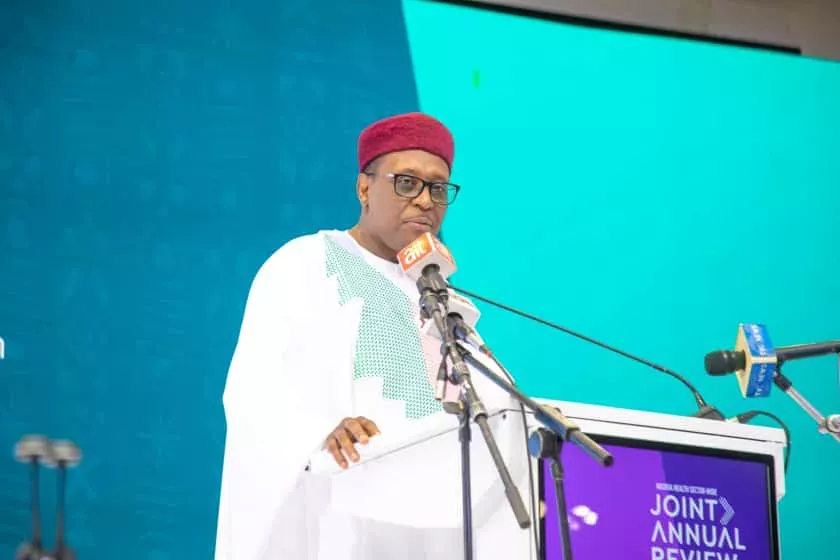By Iyemah David
The Nigeria’s Federal Government has launched new strategic tools and initiatives to shift the health sector from review to action, including an automated standing orders mobile app for community health workers.
The Coordinating Minister of Health and Social Welfare, Professor Muhammad Ali Pate said this on Friday at the close of the three-day 2025 Joint Annual Review (JAR) meeting in Abuja.
He said the initiative aims to improve healthcare delivery, boost efficiency, and strengthen the health workforce to achieve Universal Health Coverage.
The minister said government, development partners and subnational actors had collectively assessed progress, challenges and opportunities under the sector-wide approach (SWAp).
“Over the last three days, we reviewed our progress, our challenges, and the opportunities before us. We have been candid with each other: yes, we have made progress, but we also recognise that significant challenges remain.”
According to him, the meeting marked a shift from review to action, with the launch of new strategic tools, reports and digital platforms that are expected to drive evidence-based delivery across the health system.
“Today, we are laying the foundations for actions going forward as we launch the set of strategic tools, reports, and platforms that will strengthen the implementation of our national priorities.
“These products reflect our commitment to transparency, to data, to accountability, and to using evidence to drive results that matter for our people,” he said.
Prof. Pate said the tools respond directly to Nigeria’s most urgent health priorities, including maternal and newborn mortality reduction, immunisation equity and zero-dose elimination, health security, primary health care revitalisation, and climate and health resilience.
He commended the Permanent Secretary of the Ministry, Ms Daju Kachallom, for championing the work on climate and health adaptation, which has gained recognition in global health circles, including The Lancet.
“For some reason, she picked the issue of climate and health adaptation personally. She has been recognised for this, and her Lancet commentary will be out soon. Our Permanent Secretary is turning out to be an amazing expert,” he said.
Pate also highlighted progress in data strengthening and digital transformation. He said codifying new tools would make it easier to maintain standards and hold institutions accountable.
“We may falter occasionally, but I hope that in many cases we will exceed the standards we are setting,” he said.
He urged states to adopt the tools as reference materials, digitise them, place them on official websites, and ensure technical experts’ study and apply them.
“Let them not become shelf documents. Use what is usable, and if you find gaps, circle back to us so we can make them better,” he added.
During the session, the Africa Centres for Disease Control and Prevention (Africa CDC) also weighed in on Nigeria’s reforms.
The Director-General of Africa CDC, Dr Jean Kaseya, said Nigeria’s success begins with its unified and integrated national health plan.
“Start with one plan, an integrated plan. A country like Nigeria is eliminating 30 to 40 per cent of inefficiencies simply by having one plan.
“Everyone working under one vision, one plan, one budget, and one implementation model. This is not easy to achieve in a federal country like Nigeria, but Nigeria is succeeding, and that is why I commended it,” he said.
Dr Kaseya added that once a country harmonises its plans, it attracts more domestic resources, reduces inefficiencies such as ghost workers, strengthens procurement processes and aligns external financing with government priorities.
“This is the pathway to sustainability and sovereignty for Nigeria,” he said.
Earlier, Dr Oyebanji Filani, Chair of the Forum of Commissioners for Health and Ekiti State Commissioner for Health, said the whole-of-government and whole-of-society approach being deployed in the sector had boosted citizens’ confidence.
“The voices of our people were fully factored into this process, and Nigerians appear to be recognising the leadership of President Bola Ahmed Tinubu in steering these reforms.
“Their growing confidence strengthens our resolve,” he said.
Dr Filani added that the government would continue to work “into 2026 and beyond” to fulfil presidential commitments.
“We have incorporated all recommendations and signed the compact already,” he said.
The 2025 Joint Annual Review brought together nearly 1,000 delegates representing federal and state governments, development partners, the Nigeria Governors’ Forum, ALGON, academia, the private sector, civil society and traditional institutions.




